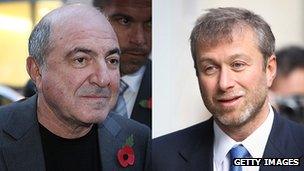Uncovered: Trial of the oligarchs
- Published

Mr Abramovich (right) says Mr Berezovsky never owned a formal stake in his companies
For Mr Berezovsky, this case at the commercial court here in London was about betrayal - a father and son relationship soured, a beautiful business partnership severed.
For Mr Abramovich, the case was simply about greed - a well paid political fixer who got well above his station and who treated the Chelsea Football Club owner like a cash cow.
It took four months to get through the acrid testimonies of both oligarchs, and a further five to get a ruling.
The evidence was so complex that, had the documents not been digitised, it is estimated the courtroom would have been awash with more than five million sheets of paper.
Above everything, says costs lawyer Jim Diamond, this was a case that smacked of money.
"It is - according to the grapevine of the legal profession - the most expensive legal case involving individuals in the history of the world," says Mr Diamond.
"You have got two very, very wealthy people who are really throwing every single resource at the particular exercise.
"If you look at a combination of rates of the lawyers - anywhere between £200-250 to £600 or £700 an hour - in the city. And if you have teams of 40 or 50 people, you can understand how these cases can become very, very expensive.
"So it wouldn't surprise me if the cost reached £150m."
'Dirty linen'
At the heart of the case was a longstanding dispute.
Boris Berezovsky claimed he held a sizeable stake in the younger oligarch's oil and aluminium companies, and was bullied into selling those shares at a knock-down price after Roman Abramovich threatened that the Kremlin - with which Mr Berezovsky had fallen out - would seize them.
The Chelsea Football Club owner maintained that Mr Berezovsky had never owned a formal stake in his companies, and had simply been employed as a political fixer to help him make the necessary connections to build up his business empire.
Russian media was transfixed by the case, but not necessarily in a good way, according to Russian journalist Alexei Kovalev.
"It's a matter of washing one's dirty linen in public, which is the reason it's so embarrassing for Russians."
Both of the men are, or have been, closely associated with the Russian government, which also "by association means its reputation is far from clean", the journalist said.
He added: "You see, the absolute majority of Russians believe these two people took what didn't belong to them and sold it for their own profit."
The trial has shone a spotlight on what Mr Abramovich's QC called the lawless and medieval state of post-Soviet Russia, when state assets were swooped upon by a few opportunistic businessmen.
Murky business practices came to light during the trial.
Mr Abramovich admitted to setting up companies staffed almost entirely by disabled people in order to win tax breaks, and in turn accused Mr Berezovsky of having links with Chechnyan terrorists.
Russian journalist Viktor Balagadde, who writes for the newspaper Kommersant UK, notes that neither man shied away from certain accusations of skulduggery.
"I'm just surprised that they talked so openly and so - I don't know whether you can call it sincerely - but they were so open about the way things were working in the 1990s.
"In this court case they are trying to use this chance to admit the way they acquired enormous sums of money. And by doing that, probably they are trying to legalise them and find a way how they can be kept."
Bitter feud
The case did not make any major revelations, but the steady stream of gossip certainly made some good headlines.
Mr Abramovich was described by his rival as being not very smart.
It was revealed Mr Berezovsky attended a meeting at a London hotel attired in nothing more than his bathrobe.
And while the older oligarch treated his legal team to sushi at lunchtime, Mr Abramovich was regularly spotted alone at the local Pret A Manger with a hummus wrap and a £1 carrot cake.
Mr Balagadde says his readers have cared only for the gossip, and nothing for the outcome of the case.
"People are just fishing for this little detail which will be turned later into jokes... I don't think there is anticipation for either Berezovsky or Abramovich winning from Russian society."
The case has revealed a bitter feud over massive wealth, but Mr Diamond warns it is not finished yet.
"As night follows day, I doubt that either side is going to accept the lower court's decision.
"This is probably going to go to the Court of Appeal and Supreme Court. So you could be looking at a price of anywhere between £200m-£250m for this to end."
- Published31 October 2011
- Published18 November 2011
- Published2 November 2011
- Published1 November 2011
- Published19 October 2011
- Published7 October 2011
- Published6 October 2011
- Published4 October 2011
- Published3 October 2011